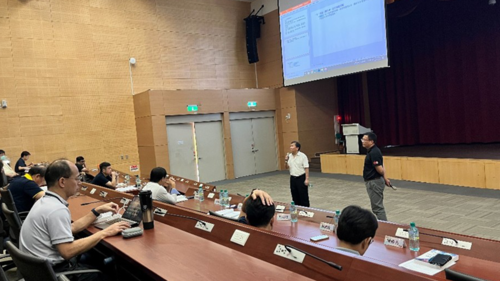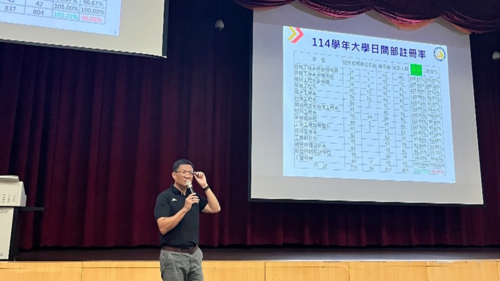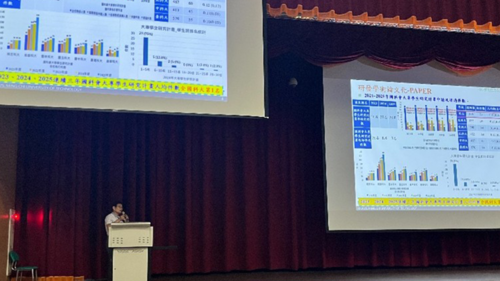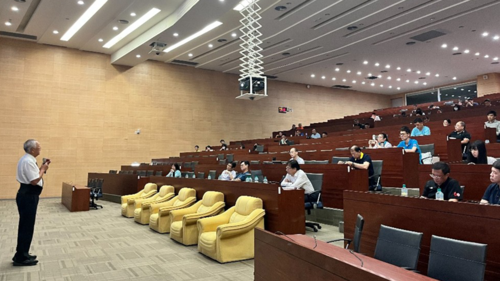2025 Academic Year Consensus-Building Retreat – Fostering Shared Vision and Advancing AI-Driven Teaching Innovation




To help all faculty members become familiar with the university’s future development directions and key initiatives, the Teaching and Learning Resources Center held the “2025 Academic Year Consensus-Building Retreat” on September 22.
The Dean of Academic Affairs, Dean of Research and Development, Dean of Student Affairs, and Dean of International Affairs presented the university’s key policy initiatives to foster a shared vision for institutional development and to enhance teaching quality and research effectiveness.
The event featured a keynote speech by Mr. Hung Chin-Kuei, a graduate of the Department of Mechanical Engineering (13th class), titled “Teaching Revolution in the AI Era – Flipped Classrooms and Self-Directed Learning”, inspiring teachers with new perspectives on AI applications in education.
Alumnus Shares AI Applications, Inspiring New Teaching Mindsets
At the invitation of the Dean of Academic Affairs, Mr. Hung returned to his alma mater to deliver a lecture and presented all participating faculty members with his latest book, ChatGPT 5 All-in-One Practice: Agent, Prompt, Projects, Canvas, GPT, Sora – AI Workflow. During the lecture, he introduced the latest features and applications of ChatGPT 5, including effective prompt engineering, multi-step task automation, AI collaborative creation, and text-to-video generation. Using examples from education, marketing, programming, and investment, he demonstrated the diverse potential of cross-disciplinary AI applications. This lecture not only deepened teachers’ understanding of AI technologies but also inspired them to consider how to integrate AI into their classrooms to promote teaching innovation and self-directed learning.
Promoting Research and Industry Collaboration to Strengthen International Research Capacity
In the area of research development, the Dean of Research and Development noted that in recent years, Ming Chi faculty members have ranked among the top private universities of technology in both the number and funding of National Science and Technology Council (NSTC) projects and undergraduate research programs per faculty member.
To further assist teachers in focusing on research, the university will continue to provide funding support for technology transfer, industry–academia collaboration, and patent applications. Additionally, resources from the Higher Education SPROUT Project will be used to enhance international exchanges of research centers and the organization of international conferences, expanding the university’s global vision and academic influence.
Streamlining Student Affairs Processes to Create a Human-Centered Learning Environment
This year, the Office of Student Affairs fully implemented digital systems for student disciplinary and demerit cancellation procedures, simplifying administrative processes and improving efficiency and transparency. At the same time, Ming Chi University has gradually adjusted dormitory management regulations to better align with the lifestyles of the new generation of students, making the housing system more flexible and human-centered, thereby enhancing the quality and satisfaction of the learning environment.
Advancing Internationalization: Expanding Outward and Deepening Inward
In recent years, the Office of International Affairs has actively promoted campus internationalization, with tangible achievements recognized in major university rankings such as Global Views Monthly’s “University Internationalization Ranking.”
The office continues to encourage faculty to lead students in overseas exchange activities and provides funding support for departments to organize international programs, aiming to expand students’ global perspectives and strengthen the university’s international profile.
Enhancing Teaching Innovation and Building an AI Learning Environment
The Dean of Academic Affairs shared the key policies promoted by the Office of Academic Affairs and the Teaching and Learning Resources Center this year, including: the implementation of double majors and minors, the transformation of junior-year internships into diversified learning modules, the course observation system, and external curriculum review mechanisms—all designed to strengthen the professionalism and quality of curriculum design.
For teachers whose course evaluation results did not meet standards, the Innovative Teaching Project mechanism will serve as the primary improvement pathway, supported by faculty learning communities and teaching material development grants to enhance instructional quality and professional growth.
In response to the rapid development of AI technology, the Office of Academic Affairs will organize multiple workshops on AI tool applications and integrate AI programming language learning into general education courses, helping all students acquire new AI knowledge and strengthen their future career competitiveness.
Toward Sustainable Development: Building a Practical and Applicable Learning Environment
Facing the challenges brought by declining birth rates, the President encouraged all faculty members to continue strengthening recruitment efforts for high school and vocational students, enhancing teaching and research, and jointly cultivating talents with practical and applicable skills to move toward sustainable development together.
中文:114 學年開學共識營 凝聚發展共識、啟動AI教學新思維
This article is simultaneously published in the 41th edition of the SDGs E-paper.






